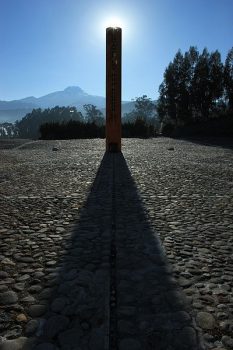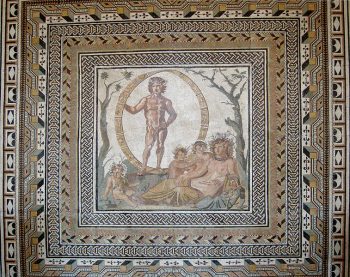The Autumnal Equinox: Astronomy in Rome Posted by Brittany Britanniae on Sep 27, 2016 in Latin Language, Roman culture
Salvete Omnes! We’re now officially into Fall! So let’s take a closer look at the Latin and Classical History behind the Autumnal Equinox.

This picture was taken the 23th September 2011 Equinox at 7:21 am. It shows how the sun projects a exact linear shade at equatorial line. Courtesy of Wikimedia Commons.
The Equinox
You may have heard that the first day of Fall is marked by the “equinox” at some point in your life, you may have learned what it was, but then forgot the specifics. The times we live in do not encourage an education system or society at large to teach or remember what an equinox is, or what a solstice is, and how they are different.
If you have trouble telling a solstice and an equinox apart it is useful to take a look at the words.
“Equinox” is from late Middle English and was derived from a combination the two Latin words: “aequi”, which means equal, and “noctum”, meaning night. Together it denotes “equal night”
“Solstice” evolved from Middle English and Old French from the Latin words “sol”, for sun, and “stit-“, related to “sistere”, which meant stopped or stationary. This is the same kind of “-stice” in “armistice”. Together it denotes “stationary sun”.
The Autumnal Equinox that came and went, marking the beginning of Fall for those of us in the Northern Hemisphere, marks the halfway point of the Sun as it travels, inching daily, back and forth through our sky. Or from a broader perspective, it is one of the two days of the year when the Northern and Southern hemispheres receive the same amount of illumination.
Ancient Rome and the Heavens
Now before we feel too guilty for forgetting, as a society, what an equinox really is or its significance we should take a look at the Romans.
When it comes to researching Roman Astronomy there is very little to be found. Although the Romans did celebrate We will often hear about the amazing celestial discoveries and pattern-recognizing of Ancient Babylonian, Egyptian, and Chinese astronomers, but we hear, comparatively, very little in the ways of Roman astronomers.
Ovid, in the Fasti, remarked on an older Rome, in the time of Romulus and Numa:
“libera currebant et inobservata per annum/ sidera”
“Free ran the stars and unobserved, in their revolutions.”
Very Ancient Romans, as other cultures were timing and counting and predicting, weren’t participating in the boom of the science of astronomy.
This is perhaps because the Ancient Romans were more transfixed not by defining the movement of the stars, but by what the movement of stars and celestial wanderers could tell them about their own lives here on Earth. They were preoccupied the Astrology; star signs and fortune telling.

Central part of a great floor mosaic from a Roman villa in Sentinum (today Sassoferrato in Marche), ca. 200–250 CE. Aion, god of eternity, in a celestial sphere decorated with zodiacal signs. Courtesy of Wikimedia Commons.
Ovid studied astronomy to write in the Fasti and the Metamorphoses. However, astronomy and astrology grew up together. The Roman, Manilius, composed Astronomica, being the first in the West to write about the heavenly motions and their relationship with the lives of men. He claimed his writings recalled:
“hospita sacra ferens nulli memorata priorum”
“Strange lore untold by any before me.”
Ovid recalled that the Chaldean astronomers and astrologers, indeed anyone who has studied Classical history might remember that the title “Chaldean” was often synonymous with “astrologers”, brought their science to Rome, never mentioning other Romans.
Rome and the Stars
The Roman calendar wasn’t that accurate either and was out of sync with the solar calendar. The Spring equinox, over the course of hundreds of years, shifted backwards 10 days.
However, the equinoxes seem to have been at least partially significant to the Romans in conventional ways. The Romans celebrated on the vernal (from the Latin “vernalis”, from “vernus” meaning “of the spring”) equinox with festivities and met the autumn equinox with plowing and preparing for Fall.

Illustration of an Ancient Roman House from ”Illustrated History of Furniture, From the Earliest to the Present Time” from 1893 by Litchfield, Frederick, (1850-1930). Courtesy of Wikimedia Commons.
Interestingly, the position of the Sun during the equinoxes might have also influenced architecture. Columella (4 BCE – ca. 70 CE) wrote a manual on how to position a manor house in preparation for both summer and winter. The winter dining room should face the sunset at the equinox, summer bedrooms and promenade should face the midday sun at equinox.
So, despite the absence of astronomy as a science, the equinoxes seem to have played a practical and sometimes festive role in the lives of Ancient Romans.
Sources:
Astronomy and Calendar in Ancient Rome: The Eclipse Festivals. Leonardo Magini. L’ERMA di BRETSCHNEIDER, Jan 1, 2001.
http://penelope.uchicago.edu/~grout/encyclopaedia_romana/calendar/romancalendar.html
The World of Ancient Rome: A Daily Life Encyclopedia [2 volumes]: A Daily Life Encyclopedia. James W. Ermatinger. ABC-CLIO, Aug 11, 2015

Build vocabulary, practice pronunciation, and more with Transparent Language Online. Available anytime, anywhere, on any device.
About the Author: Brittany Britanniae
Hello There! Please feel free to ask me anything about Latin Grammar, Syntax, or the Ancient World.




